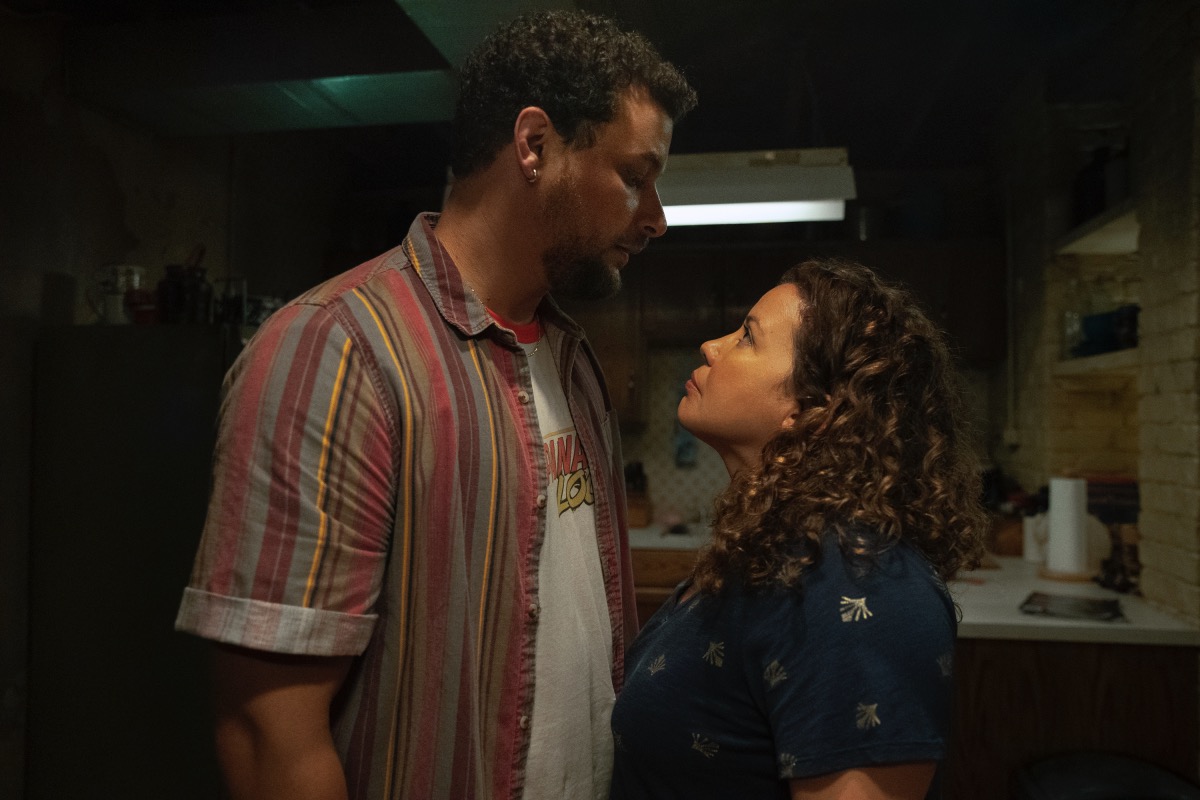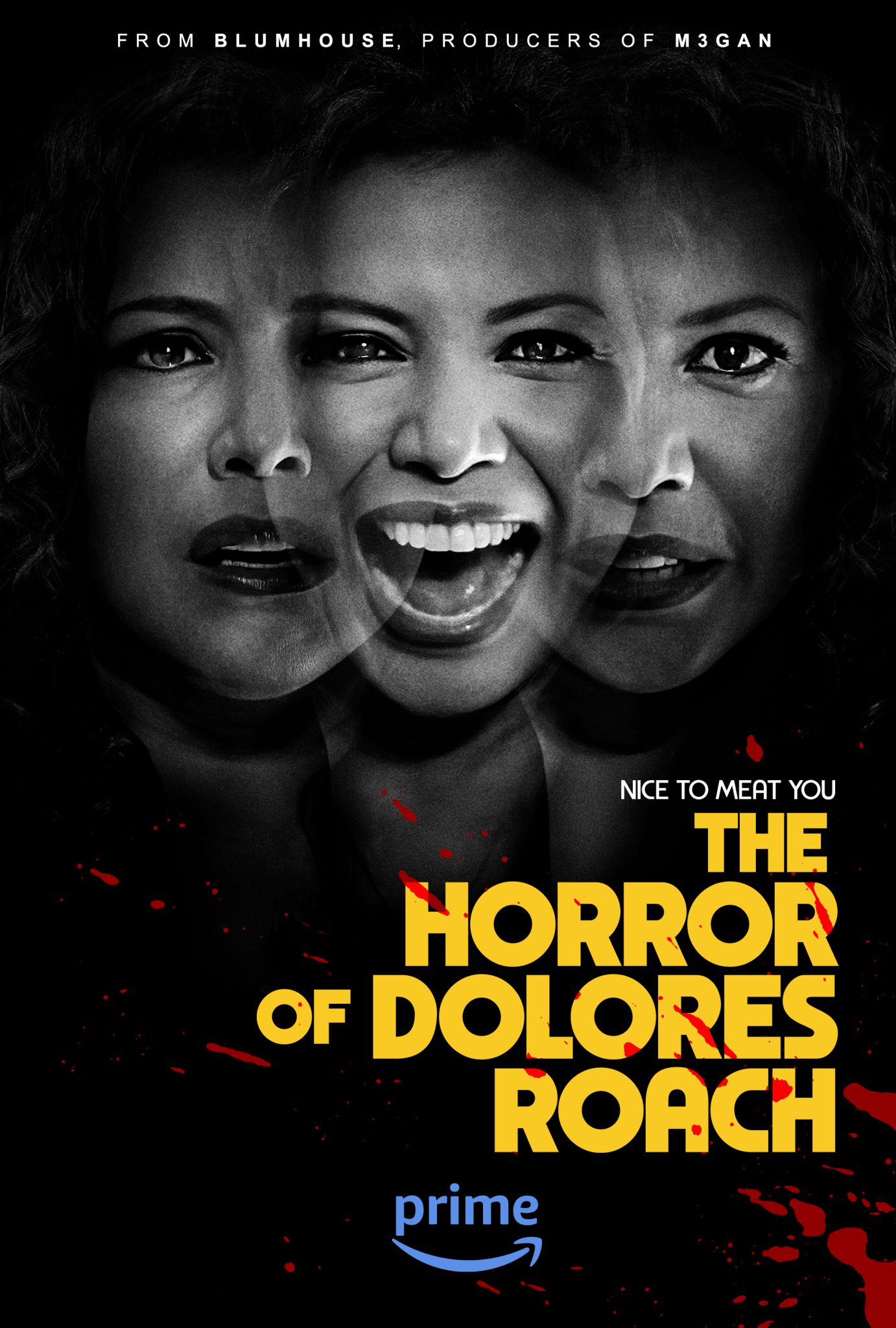

From left: Alejandro Hernandez (Luis) and Justina Machado (Dolores Roach) star in ‘The Horror of Dolores Roach’ on Prime Video. (Courtesy of Prime Video)
“Yes, representation is important. But what’s also important is for us to see ourselves in everything. We don’t always have to represent the sunny side,” says Justina Machado, ahead of her starring role in The Horror of Dolores Roach, which began as a one-woman play before becoming a podcast and now a Prime Video series. It’s a dark-comedy series with plenty of frights—think of it as the Latinx Sweeney Todd, sans the musical numbers.
“This genre doesn’t have a lot of Latino, Hispanic people in it,” Alejandro Hernandez tells Latino Rebels. “That’s the thing that drew me the most of it. And also the character is just so layered and strange and weird and fucked up and fun.”
Hernandez is talking about his character Luis, who offers Machado’s Dolores a free room in his basement apartment after she returns to Washington Heights, having spent nearly 20 years in prison. Luis idolizes Dolores, who ran the block with her kingpin boyfriend when he was still a lonely teenager. Now, having inherited his deceased father’s empanada shop, he’s one of the last holdouts as the New York neighborhood becomes fully gentrified.
Luis is also the one who decides how to dispose of Dolores’ victims… by serving them up to unwitting customers—initially via free samples!
“When I listened to the podcast, I got the tone of the show. And we worked really hard at getting the tone,” Machado says. “We really paid attention to those parts where we could amp up the humor. It’s in the script, man, those writers are incredible, they’re insane. And Alejandro is a funny guy. And I came from the sitcom One Day At A Time, so I think we just kind of knew when to throw in that funny stuff. I find it really funny and I think it’s funnier than I thought it was gonna be.”
Machado chuckles, explaining one of the show’s recurring bits. “Not eating: that’s where (Dolores) draws the line. It’s my favorite part about her. She’s like, ‘How dare you? How dare you?’ when she’s snapping the necks. It’s so hilarious. It’s crazy.”
When asked if there’s some part of her that wishes Luis and Dolores end up together, it’s a flat, “No.”
“Not even a small part,” she says. “From the beginning, she knows he’s crazy. But so is she. But she’s a sociopath who thinks that he’s the crazier one. So that would never work.”
The comedy balances with the grotesque, particularly when the show finally reveals the corpses Luis has been butchering.
“It was disgusting, and that’s the truth. It was so gross. It was super creepy, too,” says Machado, crediting the set design and prosthetics for helping with her performance. “It felt desperate just being in there.”


Courtesy of Prime Video
What makes the horror that much more scary is just how relatable the characters are. Dolores starts off as a round-the-way girl, her high ponytail swinging. Maybe prison hardens her, maybe she always had this darkness inside her, but she seems pulled into the darkness, even as she’s clearly making (terrible) choices along the way to embrace it.
And Luis reminded me of so many of the frustrated young men I grew up with… until he takes his extreme turn.
“He’s somebody that’s very, extremely lonely and heartbroken and feels really bad about themselves,” Hernandez says. “Things like loneliness and not feeling good about yourself and insecurity and having this deep sense of loss and worthlessness and directionlessness. Those are things that everybody can relate to on a certain level.”
Now, isn’t that horrifying? It hints at a certain, inherent darkness in human nature, even as the show clearly has fun with it.
“I just handle everything with honesty,” Machado says. “So whatever is in front of me, I just play the truth of it. And from there, you get everything you need.”
While Machado asks, “What would that be like? I’ve never killed anybody,” she can relate to Dolores’ freedom in such murderous moments.
The character eventually gives up on maintaining any sort of respectability or pretense of playing by society’s rules. And Machado, for her part, says, “I had fun being free.”
That fun shows throughout this dark series that mixes cannibalism and mass murder with jokes and charm, swirling in some desperate aching for good measure. It’s a potent recipe—even if the actual cooking in the show will ruin your appetite.
***
Cristina Escobar is the entertainment reporter for Latino Rebels. She is also the co-founder of latinamedia.co, uplifting Latina and gender non-conforming Latinx perspectives in media. She’s a member of the Latino Entertainment Journalists Association and writes at the intersection of race, gender, and pop culture. Twitter: @cescobarandrade


